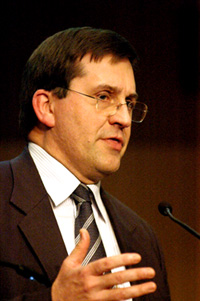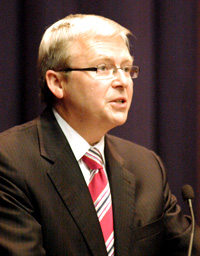
DAVID ADAMS reports on the first national Christian Heritage Forum…
“Christian values” have played a key role in Australia’s economic development and must continue to “counterweigh the seductive appeal of materialism”, according to Professor Ian Harper.

PICTURE: Ramon Williams
“Our prosperity must be moral as well as material or it is no prosperity at all,”
says Professor Ian Harper.
In a paper presented at the first Christian Heritage National Forum held in Canberra last weekend, Professor Harper – chairman of the Howard Government’s Fair Pay Commission and executive director of the Centre for Business and Public Policy at the Melbourne Business School – said Christian principles – including the insistence on the rule of law, equality , the need for transparency in administration and government, and the binding nature of contracts – lay at the heart of Australia’s “inherited” political and economic culture and remained relevant for Australia’s economic development.
“No human economy can succeed without a substrate of ethical and cultural values. Christians believe that their faith is in the Truth, which will set them free, beginning but not ending with the life in this world.”
Professor Harper said that while the establishment of a “Christianised culture” does not mean economic hardship and suffering will “magically disappear”, “(i)t does mean, however, that decisions will tend to be made in the right order – putting first things first: the dignity of the individual; the importance of family and neighbour; the priorities of freedom and mutual obligation”.
“Australia’s economic story shows that the billions of decisions, plans and experiments conducted over the past two centuries within the parameters of Christian values have by and large delivered substantial material benefits to most of our citizens,” he said.
“Economic liberty has been a vital element of the formula. So, too, has been a preparedness to exercise that liberty in a virtuous manner. Christianity has enabled us to intuit the proper relation between the two and will continue to do so…Our prosperity must be moral as well as material or it is no prosperity at all.”
Elsewhere, Professor Harper noted the “readiness” of Australians to “fall into a Christian mode of response when the chips are down”.
Referring to the bid to rescue the two trapped miners in Beaconsfield, Tasmania, earlier this year, he asked “how many people noticed the important accorded by the secular media to the religious dimension of this event?”.
“It seems that, in spite of the seemingly relentless progress of secularism into the homes and lives of everyday Australians, Christianity is still a quietly bubbling spring not far below the surface of our culture. Occasionally – as at Beaconsfield – it breaks through to the surface.”
The forum, which was held at Parliament House over Sunday and Monday this week, was organised by a committee headed by Associate Professor Stuart Piggin, of the Centre for the History of Christian Thought and Experience at Macquarie University.
Hosted by politicians including Family First Senator Steve Fielding, former Nationals leader John Anderson and Nationals Senator Barnaby Joyce, it was aimed at helping “Christians and those who embrace Christian values to find a constructive voice and to perpetuate into the future the best from our past”.

PICTURE: Ramon Williams
“No political party owns God. Our challenge is to respond to the great ethical challenges of our age – consistent with the dictates of a properly informed human and Christian conscience,” says Kevin Rudd, Opposition spokesman for foreign affairs, trade and international security.
As well as Professor Harper, speakers included Roger Corbett, the chief executive of Woolworths, Kevin Mason, president of the New South Wales Court and Appeal and Anne Robinson, chair of World Vision.
In a speech examining the interplay between church and politics, Kevin Rudd, the Opposition spokesman for foreign affairs, trade and international security, said the Australian Labor Party “refused to accept the implied proposition” from the Federal Government that God had become the “wholly-owned subsidiary of the political conservatives – Liberal, National or Family First”.
“No political party owns God. Our challenge is to respond to the great ethical challenges of our age – consistent with the dictates of a properly informed human and Christian conscience.”
He said three key issues “deserving of Christian reflection” at present include industrial relations, asylum seekers and global climate change.
Elsewhere in his paper, Rudd said the churches have overall been a “significant force for good in shaping of the Australian nation”.
While acknowledging the wrongs of the church – including the politics of sectarianism, child abuse, institutional interference in political parties and discrimination in dealings with indigenous Australians, Rudd said the “combined contribution of the churches to Australia’s education, health and welfare needs over the last 200 years has been incomparable”.
“The churches, therefore, should cease apologising for the contributions they have made to Australia’s national life,” he said. “And as a consequence, the churches should continue to have confidence to engage the great public and political debates of our time – rather than feeling they are no longer qualified to do so.”
Mr Rudd said it is “unreasonable” for Treasurer Peter Costello or Foreign Minister Alexander Downer to suggest that the only valid criticism from the church “is if it is delivered as an economist, an intelligence analyst or else a professional practitioner from the relevant technical field of public administration”.
Meanwhile Brad Baker, exhibition development and design manager at Sydney’s Powerhouse Museum, told the forum that most Australians “have little or no knowledge of the role that Christianity has played in the shaping of this nation”.
“(I)t is our opportunity, if not our responsibility, to raise their awareness and, hopefully in that process, their respect for what has been a very complex struggle that continues today and will continue well into our future.”
To that end, he said that he has been involved in discussions surrounding the possibility of developing an Australian Christian heritage centre which would be a “contemporary, interactive experiential” research and collection facility for Australians to “discover and reflect on our achievements, and on our failures”.
~ www.australiaschristianheritageforum.org.au






